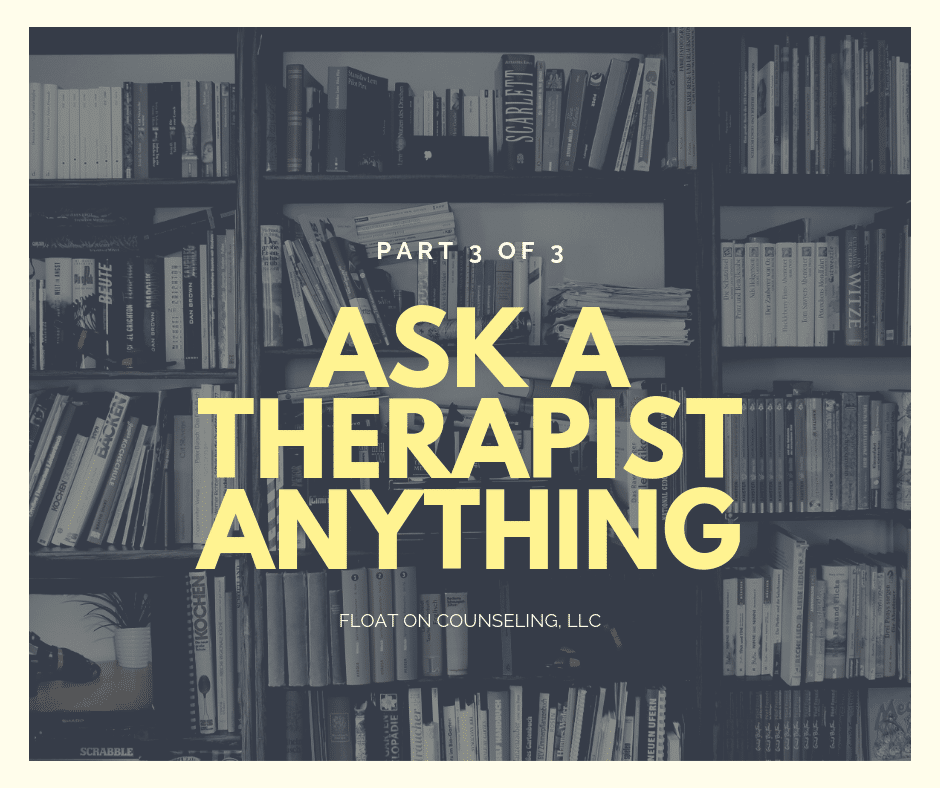This is part 3 of 3 in my “Ask a Therapist Anything” series. Here, I answer questions about the general agenda for sessions, what kind of an environment is most conducive to opening up, and whether or not I’ve been to therapy myself.
If you missed Parts 1 and 2, you can check them out here. See Part 1 or Part 2 “Ask a Therapist Anything”.
8 – “Are sessions ran via agenda of things to discuss or more starting off question/discussion and continuing as conversation allows?” – Before sessions, I generally review notes from the previous session to jog my memory. I usually have a very loose “agenda” that is lined up with where we left off last session. That being said, the agenda is very flexible. A lot can happen in a week, so I sometimes have an idea as to what a session might involve, but find out that there are more pressing issues to discuss.
I also like to remind clients that therapy is their time…This means that even if I have an idea as to where I think we should go, that they are free to change the course and to use the time to work on things they think will be most helpful.
9 – “What do you feel makes for an environment that is conducive to opening up?” – I think that the most important factor when it comes to feeling comfortable opening up (and ultimately making progress) is the quality of the “therapeutic relationship” – the connection between Client and Counselor. It has to be a good fit. It needs to feel natural. The two need to “click” to at least some degree. Another crucial component is that of trust. Some people are more naturally trusting of Therapists and the process than others and sometimes trust is something that needs to be developed over time. Therapists need to be able to convey the message that what is being discussed in the office will stay in the office. Aside from the therapeutic relationship and trust, is the environment. A Therapist’s office needs to be comfortable, quiet, private, and free from distractions.
10 – “If you have not been to therapy, why not?” – This is probably my favorite question and that’s why I saved it for last. Traditional therapy models advise against clients knowing much about their Therapist. After all, therapy is about the individual being served and not the Therapist. There are still many Therapists who would probably advise against disclosing much of anything about themselves (to include whether or not they’ve ever been to Therapy). More recently, though, more Therapists have been willing to disclose about themselves when appropriate/helpful, to include sharing experiences they have had in Therapy. Many Therapists I know have either been to Therapy in the past or currently participate in Therapy – and this is something they are open about. Many graduate Psychology/Counseling programs require that future Therapists participate in Therapy themselves to not only work on resolving “unfinished business” before helping others, but to better understand what being on the other side of the process is like. I, myself, fall into the camp of a Therapists who have been to therapy and who are open to sharing about it. Although I don’t think it absolutely necessary to have done Therapy to be an effective Therapist, I think it would be difficult to understand the vulnerability involved (and many other factors) experienced by the clients I work with, had I not experienced it for myself. More importantly, the insight gained from the self-reflection that takes in therapy, allows for increased awareness and a deeper understanding of oneself. This is so important when it comes to helping others.
My first experience with Therapy was as a kid. My parents thought it would helpful for me to see a Counselor during a time of significant loss in our family, which included the death of loved ones and a divorce. I remember gaining a good deal of relief by just having a neutral person to talk to. I processed grief, learned that my feelings were normal, and gained new perspective on things. This is when I first thought I might want to be a Therapist someday!
My second experience with Therapy was during Graduate school. During this time, I not only wanted to experience Therapy as the client (and to learn from the Therapist I saw), but also wanted to work on some unresolved issues that I thought might get in the way of my ability to effectively help others. This experience – and opportunity to self-reflect, learn, and grow – was invaluable and helped me build a solid foundation for building a career that involves helping others. Had I not done this, I’m not sure I’d be doing what I am today.
Even though I’m not currently in Therapy, it’s something that’s always on the table as an option should I face any difficult challenges in the future. To be most effective as a Therapist, I have to make sure I’m in the best kind of emotional/mental space in order to create that space for my clients…and if that means needing to do exactly what I encourage others to do, I will when it’s necessary!
If you’re considering starting therapy for yourself, feel free to call/text 727-258-5231. Either that or you can send us a message.
Float on Counseling, LLC is located in the Carrollwood area of Tampa on North Dale Mabry Hwy.


Hello I’m 62 and I recently discovered by husband of 35 years had a affair eight years ago. He also had an affair twenty years prior. He had a accident eight years prior to the second affair where he sustained a brain injury. He is totally disabled and is unable to work due to his injury. I don’t know that I want to continue to stay married to him but I feel somewhat guilty because of his present circumstances. Would it be wrong to leave him.
Sorry I did not see this comment earlier…It sounds like a complex situation so it would be difficult to respond with thoughts on this without more context. Have you considered talking to a trusted friend, family member, or therapist to further explore this?